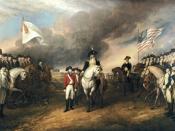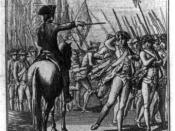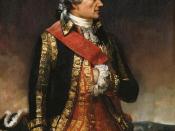Common thought in modern America is that a collection of ragtag patriots were the deciding force in ridding the colonies of their British masters. While the colonists were understandably significant in claiming independence from Great Britain, the French, too, had an important role in the United States' eventual sovereignty. Their interests were purely self-involved: they saw American independence as another chip in the British armor. The French had been involved in ongoing wars with the British for many years by the start of the American Revolution and victory across seas would have boded well for European campaigns. The Americans themselves knew that a French force in the Colonies (which would also entail an immense supply of supplies) may indeed be the deciding force in the balance of the Revolution. Ben Franklin knew this when he wrote to a friend in The Hague, "We have hitherto applied to no foreign power...
Our artificers are also every where busy in fabricating small arms, casting canon, etc. Yet both arms and ammunition are much wanted..." (Smith 1044). By the end of spring, 1778, Franklin had his wish (Smith 1044). Though some criticize the French as being a hindrance in the overall struggle for independence, this is not true. French generals, such as the Marquis du Lafayette and the Comte de Rochambeau, played an important role in the road to sovereignty. Without this pivotal alliance, the colonial soldiers would not have gained independence from Great Britain.
By the beginning of 1778 things had begun to look rather optimistic for the Americans. Not only had they defeated Britain's star general, John Burgoyne, at Saratoga in October 1777, but they had finally goaded the French Crown to join their cause (Smith 944). The foreign minister of France, Charles Gravier, the Comte de Vergennes, had long...


